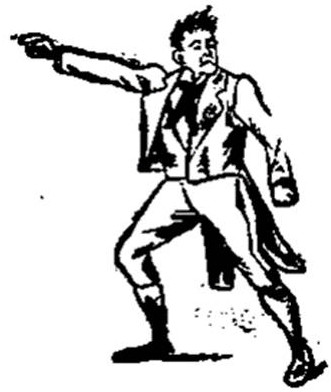This article has been transcribed from a copy of the Cardiff Times in the online collection of scanned Welsh newspapers 1804-1919 in the National Library of Wales, with grateful recognition of the free access accorded to all readers. A decorated initial has been added.
Explanatory Notes
Lord Dundreary: a good-natured, brainless aristocrat in the play Our American Cousin by Tom Taylor (1858). —— David Skilton

resentiments are things that, to quote Lord Dundreary, 'no fellah can understand,' and they are as peculiar as they are occasionally troublesome.

Has no Presentiment
'A previous apprehension of something future' is the dictionary definition of a presentiment, and as a bare explanation, it is perhaps as accurate as any ordinary mortal need desire. But presentiments are something more than this, they are among the peculiar mysteries of nature that baffle science and, now and then conduce to insanity. They are unexplainable, but they are none the less actualities, and as such have to be faced and borne with as patiently as may be. How far they are allied to superstition it would be difficult to say, but it is none the less true that in districts where superstition is still rampant presentiments are of frequent occurrence, and to point out to the possessors of them that they are frequently the result of nervous tension would be to waste time, for no one is so thoroughly imbued with the value and seriousness of a presentiment as the possessor of it, especially if it should turn out to be correct. Presentiments, though of the same order of sensation, are of a different nature to dreams, and cannot be traced to that common producer of nightmare – a heavy and indigestible supper. Dreams, of the ordinary kind, are caused by the brain being at work when the body is at rest, and are not experienced in a man or woman’s waking moments. But presentiments occur as often during the day as during the night.

Full of Presentiments
Forms of presentiments are the supposed death warnings of which we frequently hear. These warnings or presentiments take various and sundry forms, but the most familiar of them is that which is popularly known as the 'death tick.'
People are said to hear these 'death ticks' immediately prior to or at the exact moment when death is seizing someone they are either related to, or are interested in, and it has ere this occurred that people have set off to the residence of a friend or relative to ascertain whether their presentiment as to their time having come were correct or only an illusion of the nervous system.

Has County-Court Presentiments
So far as my own experience goes I have usually heard mention of these presentiments after the death of the persons they referred to, and I am sceptical as to their value or reality even though I have heard of many cases in which they have been alleged to have been mentioned prior to the death of their subject – if one can use the term in connection with a presentiment.
People have been known to wake up in the middle of the night with a presentiment that something was going to happen either to themselves or others, and though these presentiments generally take a more vague form than do the 'death ticks,' they are yet reported to be as reliable in their results as their more tangible rival.
Presentiments are, as a rule, of an unpleasant order, and relate for the most part to ill-luck, bad news, or death. It would be a pleasant change if the dealers in presentiment would vary the monotony of their grief-laden ways and predict something pleasant for a change. With so much doubt surrounding the cause and effect of presentiments, it is almost difficult to look upon them with a serious eye, and th[at] people so frequently scoff at them may be put down to the fact that in this practical age anything appertaining to the supernatural is looked upon with an eye of suspicion. In the country districts, where the force of education has not been fully felt, presentiments hold the sway, and any one who may have accidentally mentioned a presentiment that has been even partially realised is certain to be looked upon with a certain amount of awe and reverence.

A Bogie Man. (A Modern Form of an Allegorical Presentiment)
Taken all round presentiments are most unpleasant things, and generally point to a state of health which is far from satisfactory. Bad health leads to morbid conditions, and there is nothing likely to lead to unpleasant presentiments as such a state of things as [is] produced by a leaning towards morbidity. Therefore — unless presentiments are the result of a[n] unrecognised power within us – the best way to get rid of all such things is to keep well and keep the mind fully occupied. If these two conditions be fulfilled presentiments are not likely to be heard of, but will most probably be conspicuous by their absence.
Last modified 1 May 2022